When it comes to building your website, choosing the right platform can feel like navigating a digital tug-of-war. On one side, you have Wix — the user-friendly, drag-and-drop website builder designed to get you online quickly with minimal fuss. On the other side, there’s WordPress — a highly flexible and powerful platform that offers endless customization possibilities for those ready to dive deeper.
In this guide, we’re breaking down the Wix vs WordPress debate so you can figure out which one is the best fit for you. Whether you’re a total newbie looking to build your first site or a seasoned pro ready to take on something more customizable, we’ve got you covered. So, let’s dive in and find out which platform will be your website-building buddy!
Table of Contents
- Overview and Key Differences
- Ease of Use
- Design and Customization
- Features and Functionality
- Performance and Security
- SEO Capabilities
- Pricing
- Support and Community
Overview and Key Differences
What is Wix?
Let’s start with Wix, the easy-going, user-friendly website builder that’s perfect if you want to get your site up and running with minimal fuss. Wix operates on a drag-and-drop system, meaning you can literally click on an element (like text, images, or buttons) and drop it wherever you want on the page. No coding, no headaches, just pure creative freedom.

Wix is especially popular with beginners because it offers everything you need in one place. From hosting to design templates to built-in features like SEO tools, it’s all there, ready to go. You don’t have to worry about the technical stuff; Wix handles it for you, letting you focus on making your website look exactly how you want.
But, here’s the thing: while Wix is super easy to use, it’s not as flexible when it comes to customization. You’re working within a framework that, while broad, does have its limits. But if you’re looking for a straightforward, no-nonsense way to get online, Wix might be your perfect match.
What is WordPress?
Now, let’s talk about WordPress. If Wix is the friendly, easy-going builder, WordPress is the experienced craftsman, offering tools that can create virtually any kind of website you can imagine. But with great power comes a steeper learning curve. Unlike Wix, WordPress doesn’t have a drag-and-drop interface out of the box (though you can add one with plugins). Instead, it’s a content management system (CMS) that gives you full control over your website’s design, functionality, and performance.

WordPress comes in two flavors: WordPress.com and WordPress.org. The .com version is a hosted service similar to Wix, where much of the technical stuff is handled for you. WordPress.org, on the other hand, is where the real magic happens. It’s open-source, meaning you have the freedom to build and customize your site any way you like—but you’re also responsible for hosting, security, and updates.
The beauty of WordPress lies in its flexibility. Whether you want to create a blog, an eCommerce store, or a portfolio site, WordPress can handle it. And with thousands of themes and plugins available, the possibilities are nearly endless. However, this level of control means you’ll need to spend some time learning the ropes, especially if you’re new to website building.
Ease of Use
When you’re choosing a platform to build your website, ease of use is often at the top of the list. After all, you don’t want to spend hours wrestling with complicated tools when you could be focusing on your content or products. Let’s see how Wix and WordPress stack up when it comes to getting you up and running with minimal hassle.
Wix – Simplicity at its Core
If you’re someone who likes to dive in and start creating without needing to learn a bunch of new skills first, Wix might feel like a dream come true. From the moment you sign up, Wix guides you through the process with a friendly, step-by-step setup.
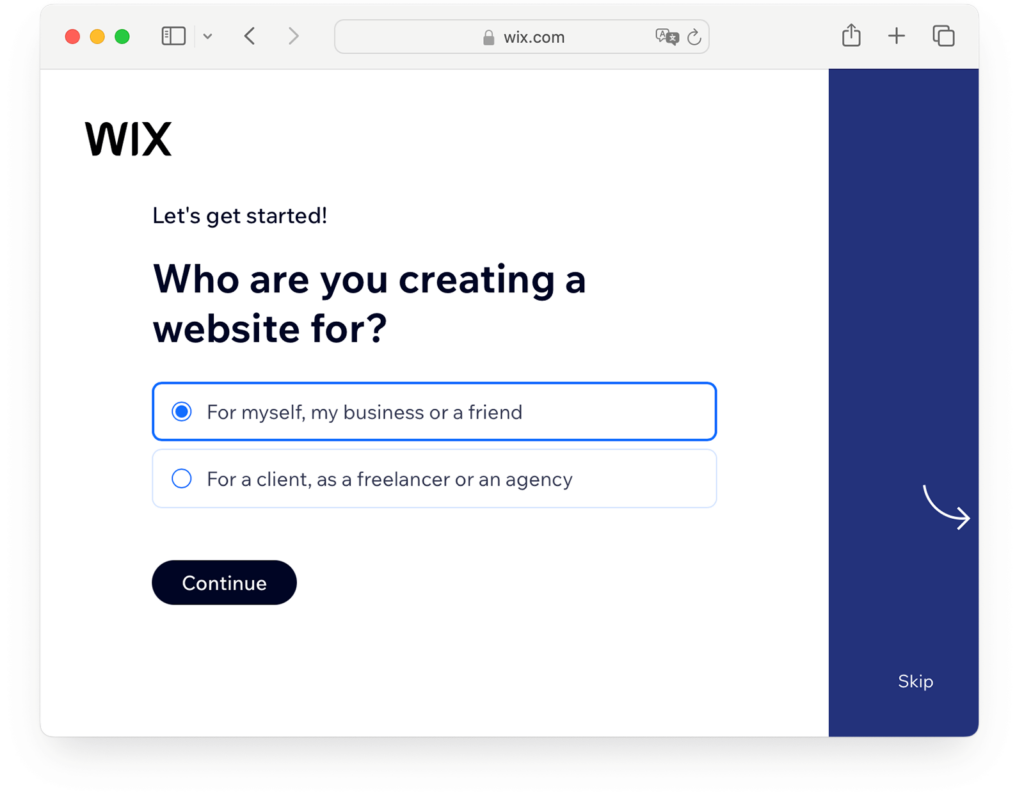
You can choose a template that suits your style, and then it’s all about dragging and dropping elements into place. Want to move a photo? Just click and drag it. Need to add some text? Drop it in where you like and start typing. It’s as easy as using a word processor or a digital scrapbook.
One of the standout features is Wix ADI (Artificial Design Intelligence). This tool asks you a few questions about what kind of website you want, and then it automatically generates a site that you can tweak and customize. It’s a great option if you’re not even sure where to start and just want something that looks good right away.

Overall, Wix is designed to be intuitive and beginner-friendly. You don’t need to know anything about coding, hosting, or design theory to create something that looks polished and professional. And that’s why it’s such a popular choice for those who want to get online fast without a steep learning curve.
WordPress – Flexibility but Requires Learning
On the flip side, WordPress offers you a different kind of experience. It’s like stepping into a workshop where you have every tool imaginable, but you’ll need to learn how to use them to get the most out of the platform. WordPress isn’t just a website builder; it’s a full-fledged content management system, which means it can do a lot more—but with that power comes a bit more complexity.
When you first log in to the WordPress dashboard, it can feel a little overwhelming, especially if you’re not familiar with terms like “plugins,” “widgets,” or “themes.” But don’t worry—once you get the hang of it, you’ll find that WordPress gives you a level of control that Wix simply can’t match.
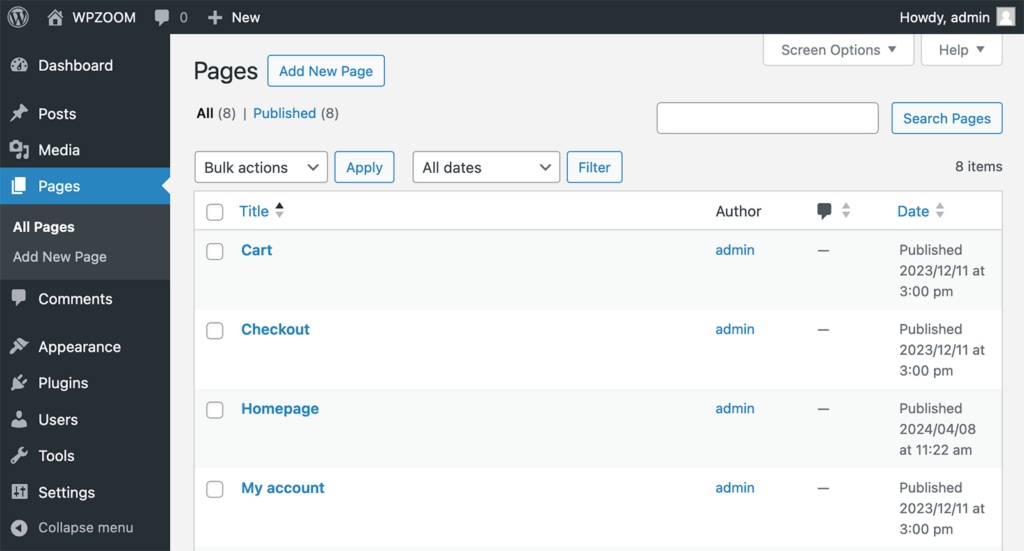
The editor that comes with WordPress, known as the Gutenberg editor, is a block-based system where you add content in sections (blocks) like paragraphs, images, or headings. It’s not quite as simple as drag-and-drop, but it’s still very user-friendly once you get used to it.
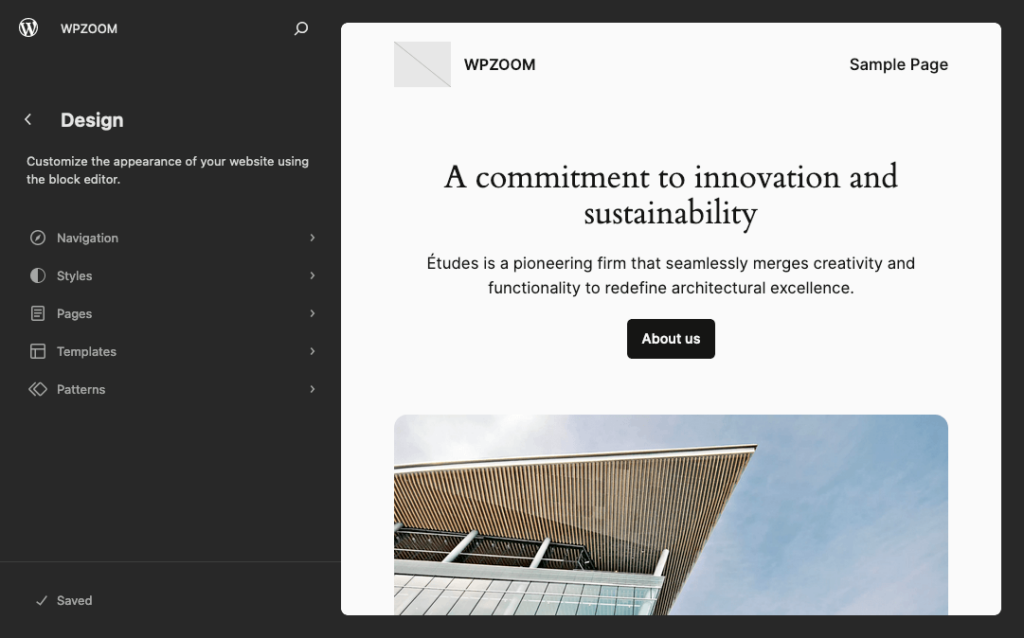
Plus, you can always install a page builder plugin like Elementor if you prefer a more visual editing experience.
One thing to keep in mind with WordPress is that because you have more options, there’s a steeper learning curve. You’ll need to choose and install your own themes and plugins, and sometimes you might need to dive into settings to make everything work just right. But the payoff is huge if you want a site that’s truly customized to your needs.
So, if you’re willing to spend a little extra time learning the ropes, WordPress offers an unparalleled level of flexibility and control over your website. But if you’re looking for a quick, easy setup with minimal fuss, Wix might be more your speed.
Design and Customization
In this section, we’ll dive into design and customization—because no matter which platform you choose, you’ll want your website to look just right. We’ll explore what each platform offers in terms of design flexibility and the ability to make your site truly unique.
Wix – Template-Based Design
Wix makes design easy by offering a wide variety of templates that are not only visually appealing but also categorized by industry. Whether you’re creating a portfolio, an online store, or a blog, there’s a template tailored to your needs. The beauty of Wix’s templates is that they’re fully responsive, which means your site will look great on both desktop and mobile devices without any extra effort on your part.

Once you’ve chosen a template, you can start customizing it using Wix’s drag-and-drop editor. You can move elements around the page, change colors, fonts, and even add animations to make your site more dynamic. It’s all about making design accessible, even if you’ve never touched a design tool before.
However, there’s a trade-off with this simplicity. While Wix offers plenty of design flexibility within its templates, there are some limitations. For instance, once you’ve chosen a template, you can’t switch to another one without starting from scratch. Also, if you’re looking to make deep customizations—like changing the underlying HTML or CSS—Wix might not be the best option. You’re somewhat confined to the structure provided by the templates, which might not be ideal if you’re looking for complete design freedom.
But if you’re after a quick, beautiful, and functional website with minimal hassle, Wix’s design tools are more than up to the task.
WordPress – Limitless Customization
On the other hand, WordPress is all about giving you the keys to the design kingdom. With thousands of themes available, both free and premium, you can find a starting point for any type of website. From minimalist designs to complex layouts, there’s a theme out there that matches your vision.
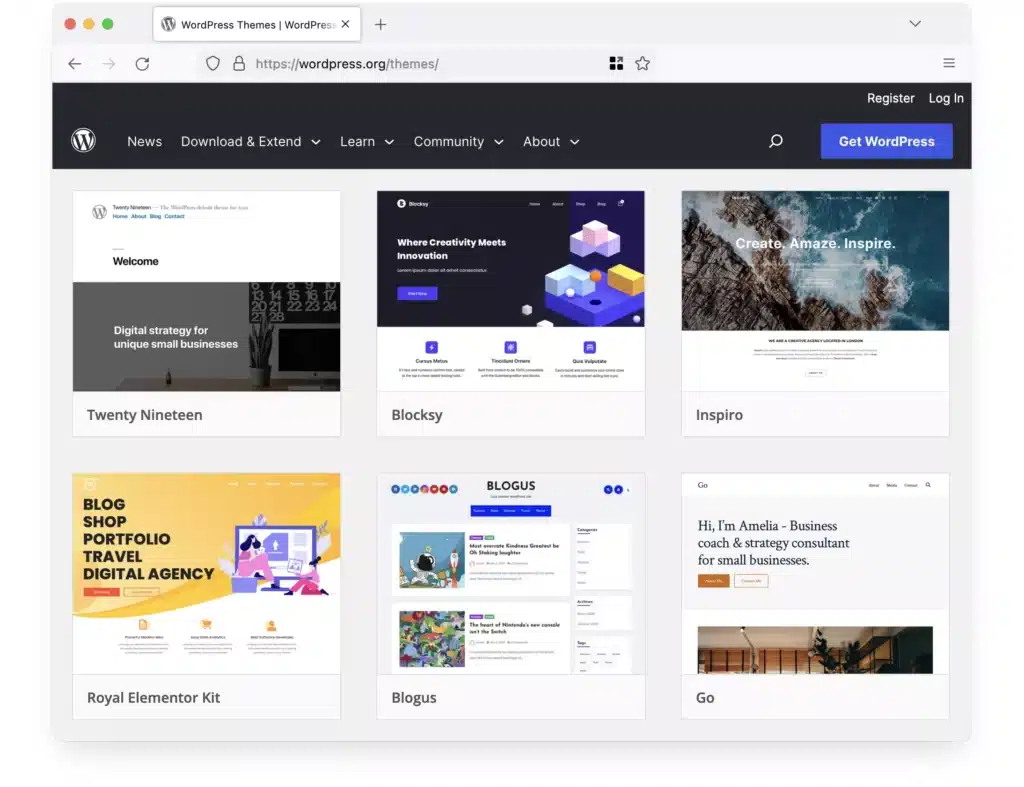

But where WordPress truly shines is in its customization capabilities. If you know a bit of code—or are willing to learn—you can tweak every aspect of your site’s design. This can be done by editing the theme’s CSS or even diving into the PHP files. Not a coder? No problem! WordPress offers an array of powerful page builder plugins like Elementor that allow you to design your site using a visual editor. These plugins bring drag-and-drop functionality similar to Wix but with far more depth and flexibility.
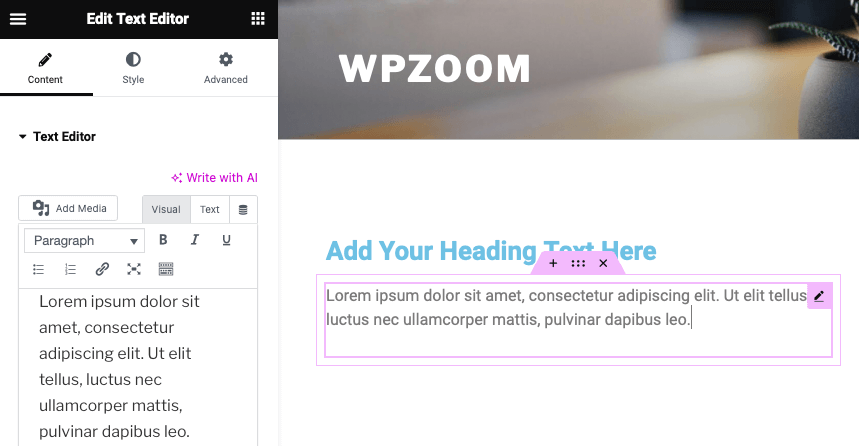
With WordPress, you’re not limited by the structure of a template. You can build custom page layouts, add dynamic elements, and even create a fully bespoke website that looks exactly how you want it. This level of customization is one of the reasons WordPress is so popular among developers and designers who want complete control over their projects.
The sheer number of customization options in WordPress can be overwhelming if you’re not familiar with web design. It might take some time to get everything just right, but for those who crave control and flexibility, WordPress is unmatched.
Features and Functionality
A website is more than just a pretty face—it needs to have the right features and functionality to support your goals, whether that’s growing a blog, running an online store, or promoting a portfolio. Let’s take a closer look at what Wix and WordPress bring to the table in terms of features and functionality.
Wix – Built-in Tools
One of the biggest selling points of Wix is that it comes with a lot of built-in features right out of the box. This makes it incredibly convenient, especially if you’re looking to get your site up and running quickly without having to piece together various tools or plugins.
For example, Wix offers built-in eCommerce functionality, making it easy to set up an online store. You can manage your inventory, process payments, and even offer discounts—all from within the platform.

Plus, there’s a blog feature that’s straightforward and easy to use, so you can start publishing content without any additional setup.

Another cool feature is the App Market, where you can find additional tools to extend the functionality of your site. From booking systems to social media integrations, there’s an app for almost everything. However, it’s worth noting that some apps come with additional costs, so it’s something to keep in mind as you scale your website.
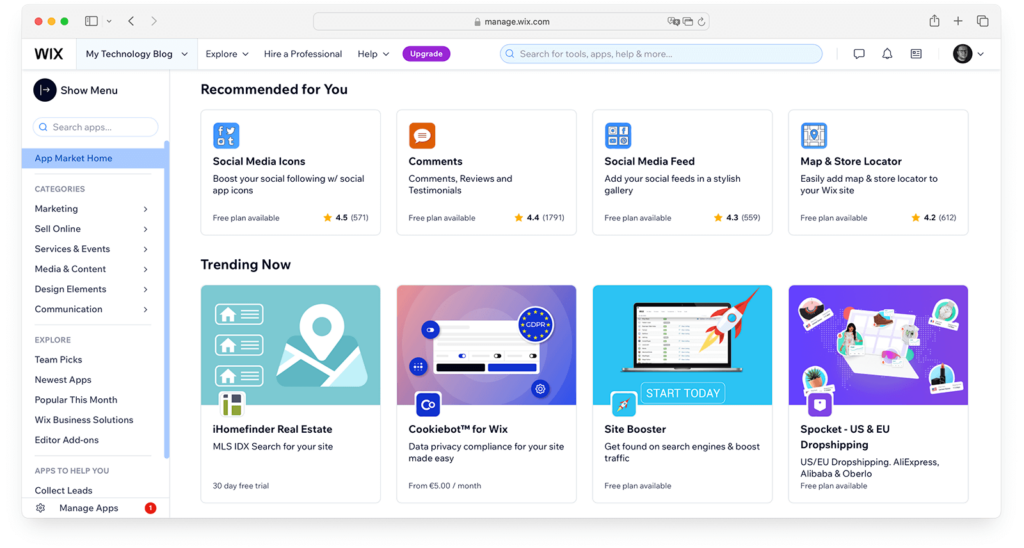
While Wix offers a lot out of the box, the trade-off is that it’s a closed system. This means you’re limited to the features and apps that Wix provides. If you’re looking for a platform that offers built-in convenience with minimal setup, Wix is a great choice. But if you need more advanced features or third-party integrations, you might find it a bit restrictive.
WordPress – Plugin Powerhouse
WordPress operates on a different model when it comes to features and functionality. Rather than offering a lot of built-in tools, WordPress provides a core platform that you can extend using plugins. This might sound like more work, but it actually gives you an incredible amount of flexibility to create a site that’s tailored specifically to your needs.
The WordPress plugin library is vast, with over 50,000 plugins available—many of them free. Want to optimize your site for search engines? There’s a plugin for that. Need to add an online store? Plugins like WooCommerce make it easy to turn your site into a fully functional eCommerce platform. From security enhancements to performance optimizations, there’s a plugin for just about anything you can imagine.
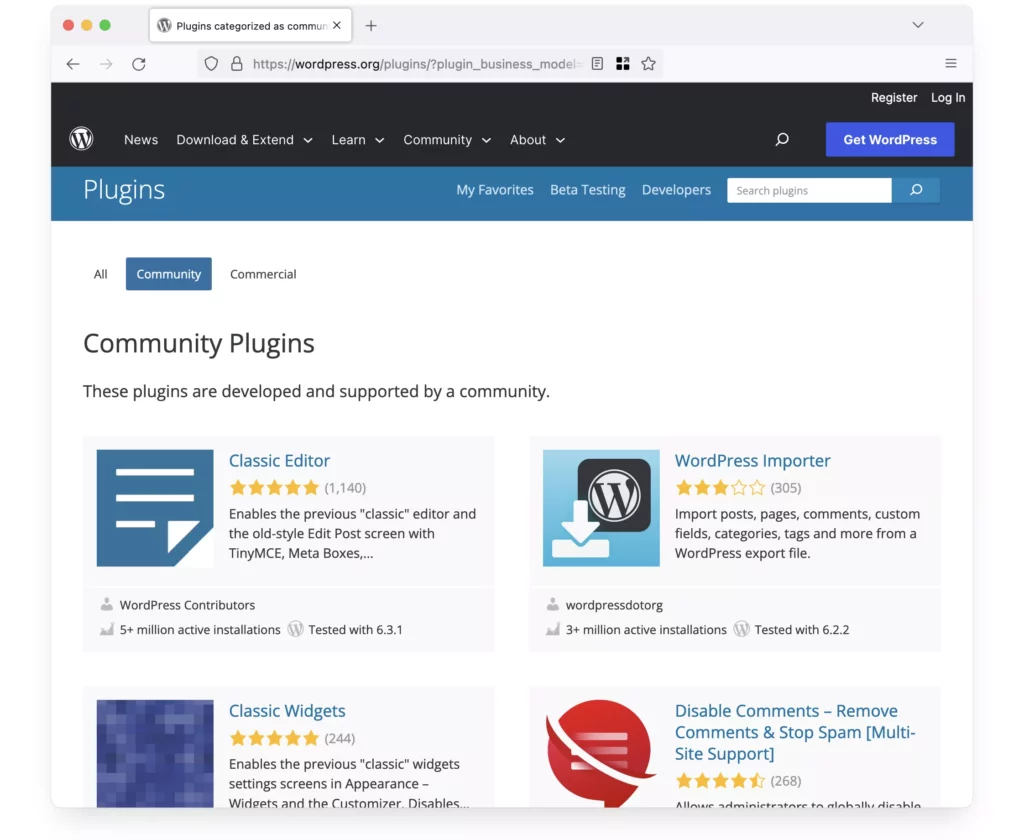

One of the standout advantages of WordPress is the ability to mix and match these plugins to create a highly customized site. You’re not locked into a specific set of features, which means you can build the exact functionality you need, whether it’s a simple blog, a complex membership site, or a dynamic online store.
For instance, if you run a food blog, the Recipe Card Blocks plugin allows you to create beautiful, easy-to-read recipe cards that are fully optimized for SEO, helping your content stand out in search results. If you’re looking to connect with your audience on social media, the Instagram Widget plugin seamlessly integrates your Instagram feed into your site, showcasing your latest photos in a stylish, customizable layout. The Social Icons Widget plugin is perfect for adding sleek, responsive social media icons to your sidebar or footer, making it easy for visitors to follow you on various platforms.
Since you’ll be managing your own plugins, it’s important to choose reliable ones and keep them updated to ensure your site runs smoothly and securely. This might sound daunting, but the WordPress community is incredibly supportive, and you’ll find plenty of resources to help you along the way.
In short, WordPress is like a Swiss Army knife—it has a tool for everything, but you need to know how to use it. If you’re looking for a platform that can grow with you and offers limitless possibilities, WordPress is hard to beat.
Performance and Security
A site that’s slow to load or vulnerable to attacks can quickly turn away visitors and harm your reputation. Let’s explore how Wix and WordPress handle these critical aspects of website management.
Wix – Managed Performance
One of the big advantages of using Wix is that it’s a fully managed platform. This means that Wix takes care of the technical side of things for you, including hosting, performance optimization, and security. You don’t need to worry about finding a hosting provider or tweaking your site’s settings to make sure it runs smoothly—Wix handles all of that behind the scenes.
Wix automatically optimizes your site for speed, ensuring that pages load quickly across all devices. This is crucial because site speed is not only important for user experience but also for SEO. Google and other search engines favor fast-loading sites, which can help boost your rankings.
In terms of security, Wix provides built-in protections such as SSL certificates for all websites, which encrypt data and help protect against cyber threats. Wix also regularly updates its platform to address any security vulnerabilities, so you don’t have to worry about staying on top of updates or patches.
However, because Wix is a closed ecosystem, you’re somewhat limited in how much you can optimize your site’s performance and security. You can’t choose your own hosting provider or install third-party security tools, so you’re relying entirely on Wix’s infrastructure. For most users, this is more than sufficient, but if you have specific needs or want more control, this could be a limitation.
WordPress – Self-Managed, High Potential
With WordPress, you have much more control over your site’s performance and security—but with that control comes more responsibility. Unlike Wix, WordPress requires you to choose your own hosting provider, which means performance can vary depending on the quality of the hosting you select. There are a wide variety of hosting options available, from shared hosting to dedicated servers, so you can choose one that fits your needs and budget.
To optimize your site’s performance, you can use a range of tools and plugins. For example, caching plugins like WP Rocket can significantly speed up your site by storing a static version of your pages, reducing the load on your server. You can also use a Content Delivery Network (CDN) to distribute your site’s content across multiple servers worldwide, ensuring fast load times for visitors no matter where they are.
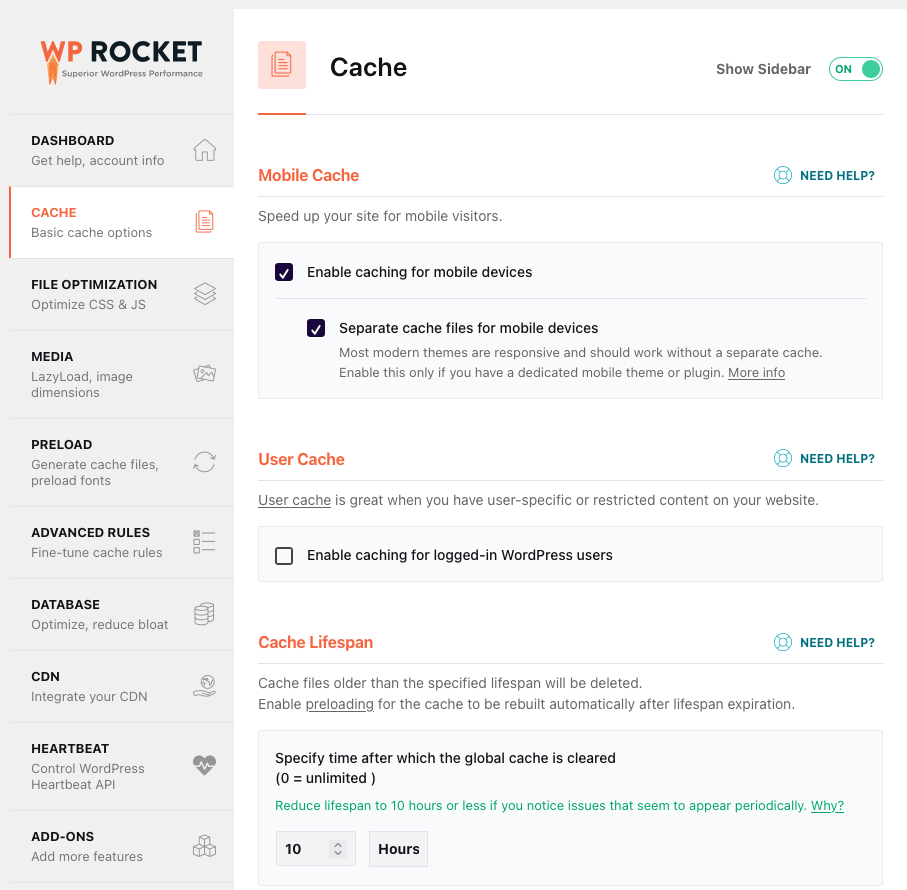

When it comes to security, WordPress gives you the flexibility to implement a wide range of protections. You can install security plugins like Wordfence to monitor and protect your site from threats. Additionally, because WordPress is open-source, the community is constantly working to identify and fix security vulnerabilities, with regular updates available to keep your site secure.
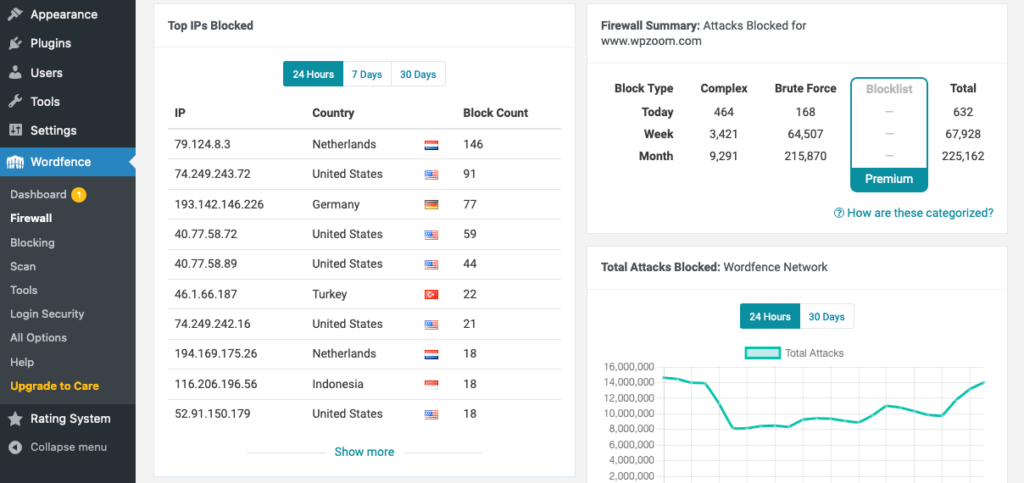
However, you’ll need to stay on top of updates for both WordPress itself and any plugins or themes you’re using to ensure your site remains secure. It’s also important to choose a reliable hosting provider that offers robust security measures.
In summary, Wix offers a hassle-free approach to performance and security, making it a great choice for users who want everything managed for them. WordPress, on the other hand, offers greater flexibility and potential, but requires you to take a more active role in managing your site’s performance and security.
SEO Capabilities
No matter how great your site looks or how well it performs, it needs to be visible in search engines to attract visitors. We’ll explore how Wix and WordPress handle SEO and which platform offers the best tools for optimizing your site.
Wix – User-Friendly SEO Tools
Wix is known for making things easy, and that extends to SEO. One of the standout features is the Wix SEO Wiz, a step-by-step wizard that guides you through the basics of optimizing your site. The SEO Wiz asks you a few questions about your website’s goals and then generates a personalized SEO plan. This plan includes setting up things like meta tags, alt text for images, and even improving your site’s mobile-friendliness—all critical elements for ranking well in search engines.

For those who are new to SEO, Wix makes the process as simple as possible. You don’t need to be an SEO expert to follow the suggestions, and most of the basic SEO features are built directly into the platform. You can easily edit page titles, descriptions, and URLs, which are all important for improving your site’s visibility.
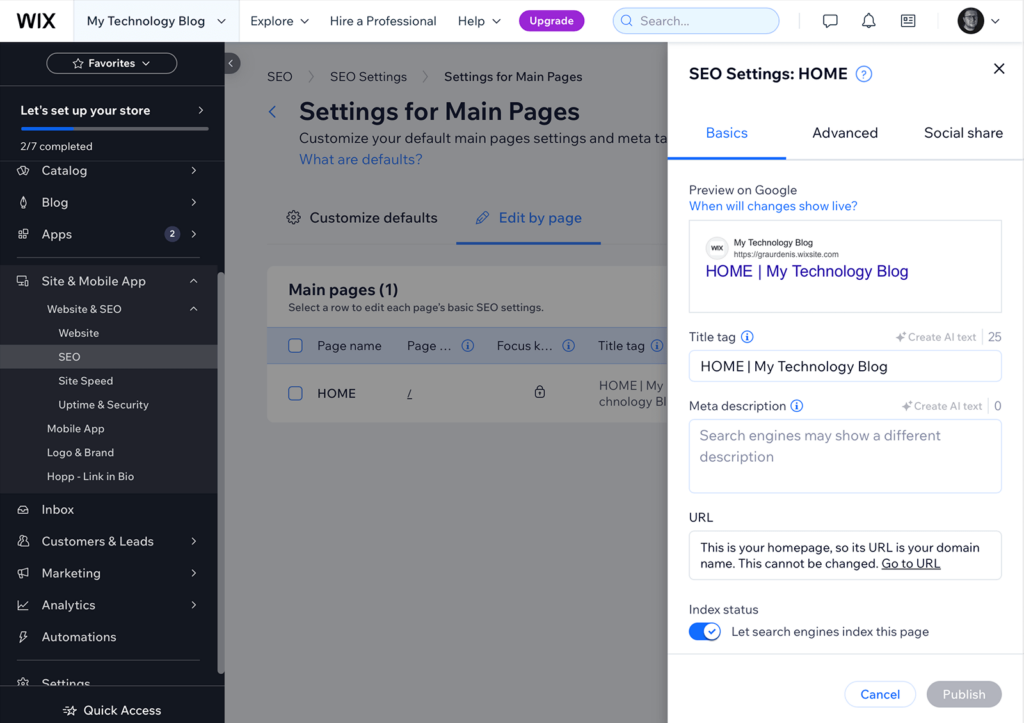
However, there are some limitations to Wix’s SEO capabilities. While it covers the basics well, more advanced SEO practices, such as managing a larger site’s structure or implementing custom schema markup, are not as flexible as they are in other platforms. Additionally, the platform’s closed ecosystem means you’re limited to the SEO tools and options that Wix provides. For most users, these limitations won’t be a dealbreaker, but if you’re aiming for a highly customized SEO strategy, you might find Wix somewhat restrictive.
WordPress – Advanced SEO Potential
If Wix is the beginner-friendly option for SEO, WordPress is the power user’s dream. With WordPress, your SEO potential is virtually unlimited, thanks in large part to its extensive library of plugins. The most popular among these is Yoast SEO, a plugin that adds a suite of SEO tools directly into your WordPress dashboard. With Yoast, you can optimize your content with real-time suggestions, create XML sitemaps, and even manage advanced settings like canonical URLs and meta robots tags—all crucial for effective SEO.
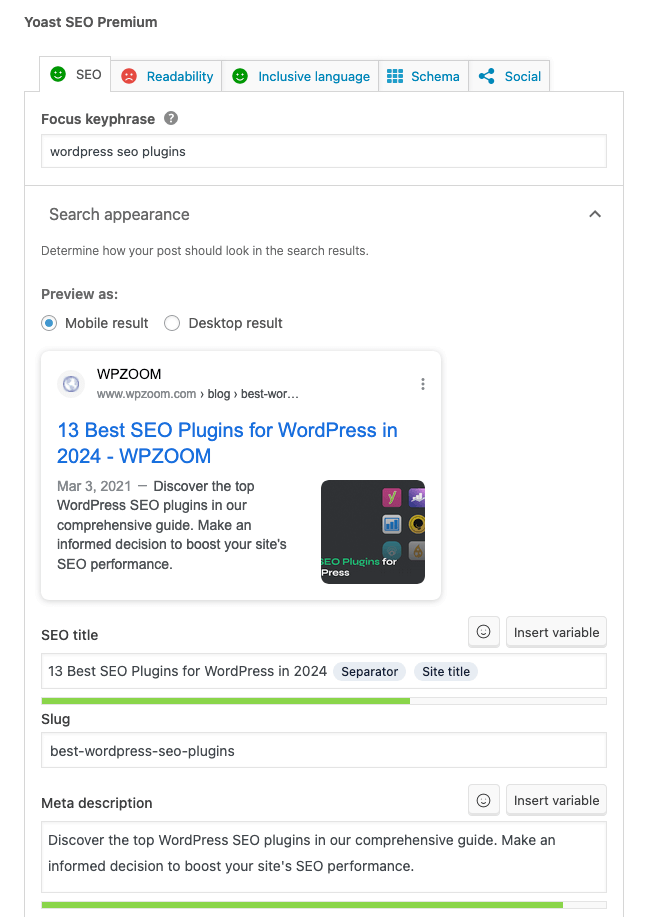

Another advantage of WordPress is its flexibility in site structure and customization. You can easily organize your content with categories, tags, and custom post types, making it easier for search engines to crawl and index your site. Plus, if you’re comfortable with a bit of coding, you can dive into the HTML and PHP to add custom schema markup or tweak your site’s performance for even better SEO results.
WordPress also excels in handling larger, more complex websites. Whether you’re running an eCommerce site with thousands of products or a blog with hundreds of posts, WordPress gives you the tools to optimize each page individually. This level of control can significantly improve your site’s overall SEO performance, especially as your content grows.
The only real downside to WordPress in terms of SEO is that while plugins like Yoast make things easier, you’ll still need to have a good understanding of SEO principles to fully take advantage of what WordPress offers. But for those willing to invest the time, WordPress provides an unparalleled platform for building a site that ranks highly in search engines.
Pricing
Budget is often one of the most significant factors when deciding between Wix and WordPress. Both platforms offer different pricing structures, which can make a big difference depending on your needs and how you plan to grow your website. Let’s break down the costs associated with each platform so you can make an informed decision.
Wix – Simple, Transparent Pricing
Wix is known for its straightforward and transparent pricing structure. The platform offers several tiered plans, making it easy to choose one that fits your budget and needs.
Wix offers a free plan, which is a great way to get started if you’re just testing the waters. However, this plan comes with Wix branding on your site, and you’ll be limited to a Wix subdomain (e.g., yoursite.wixsite.com). It’s a good option for hobby projects or experimenting with the platform, but not ideal for professional use.
The platform offers several tiered premium plans, divided into four main categories, making it easy to choose one that fits your budget and needs:
- Light ($17/month): This entry-level plan is perfect for those who need the basics. It includes 2 GB of storage space, support for 2 collaborators, a light marketing suite, and basic eCommerce features. Additionally, you get a free domain for 1 year and basic site analytics.
- Core ($29/month): The Core plan is designed for users who want to engage their audience more effectively. It offers 50 GB of storage, support for 5 collaborators, a basic marketing suite, and standard eCommerce capabilities. Like all premium plans, it includes a free domain for 1 year and basic site analytics.
- Business ($36/month): This plan is ideal for growing your brand, providing 100 GB of storage, support for 10 collaborators, a standard marketing suite, and standard eCommerce features. It also includes standard site analytics and a free domain for 1 year.
- Business Elite ($159/month): The top-tier plan, Business Elite, is tailored for scaling businesses. It offers unlimited storage, support for 15 collaborators, an advanced marketing suite, and advanced eCommerce capabilities. This plan also includes advanced site analytics, an advanced developer platform, and a free domain for 1 year.
One of the advantages of Wix is that you know exactly what you’re getting with each plan. The pricing is clear, and there are no hidden fees or unexpected costs. Plus, with Wix’s all-in-one approach, your hosting, SSL certificate, and essential features are all included, simplifying the budgeting process.
However, if you need additional apps from the Wix App Market to extend your site’s functionality, some of these may come with extra costs. It’s also worth noting that while Wix’s plans are competitively priced, they can become more expensive than WordPress if you need the higher-tier plans with advanced features.
WordPress – Variable Costs
WordPress operates on a different pricing model that can be as affordable or as expensive as you make it. The core WordPress.org software is free to download and use, but there are other costs to consider when building and maintaining a WordPress site.
- Hosting: One of the primary costs associated with WordPress is hosting. You’ll need to choose a hosting provider, and prices can range from as low as $3 to $30+ per month depending on your needs. Shared hosting is the most affordable option and is suitable for small to medium-sized websites, while VPS or dedicated hosting can be more expensive but offer better performance for larger sites.
- Domain Name: Like Wix, you’ll need a custom domain name, which typically costs around $10 to $15 per year.
- Themes and Plugins: While there are thousands of free themes and plugins available, you may want to invest in premium options for more features or better support. Premium themes can range from $30 to $100, while premium plugins can cost anywhere from $15 to $100 or more, depending on their functionality.
- Maintenance and Security: With WordPress, you’re responsible for maintaining your site, including backups, updates, and security. Some users choose to pay for managed WordPress hosting, which can cost significantly more but includes these services.
The beauty of WordPress is that you can start small and scale your expenses as your site grows. If you’re tech-savvy, you can keep costs low by doing a lot of the work yourself. However, if you want a more hands-off experience, you might find yourself spending more on managed hosting and premium tools.
Overall, WordPress can be more cost-effective than Wix, especially if you’re running a small site and are comfortable managing it yourself. But if you need a fully-featured, hassle-free experience, Wix’s all-in-one plans might be worth the extra cost.
What Happens If You Stop Paying: Wix vs WordPress
When choosing a platform, it’s crucial to consider the implications of stopping payments for your subscription. Here’s how Wix and WordPress compare in this scenario:
With Wix, if you cancel your premium plan or stop payments, your website will revert to the free plan. This means:
- Loss of Premium Features: You’ll lose access to all premium features such as custom domain, increased storage, and advanced marketing tools. Your site will also display Wix ads.
- Reverting to a Wix Subdomain: If you had a custom domain, your site will revert to a Wix subdomain (e.g., yoursite.wixsite.com), which can negatively impact your site’s branding and SEO.
- Potential Loss of Content: While Wix generally retains your content, some features or content linked to premium apps may become inaccessible.
In contrast, WordPress offers more flexibility and control if you face a lapse in payments, particularly with WordPress.org:
- Hosting: With WordPress, if you stop paying your hosting provider, your site will go offline. However, because WordPress is open-source, you retain full ownership of your files and database. This means you can easily migrate your site to another hosting provider without losing your content or design.
- Domain: If you let your domain registration lapse, your domain will eventually expire, and your site could become unreachable. However, like hosting, you can renew it or transfer it to another registrar.
- Plugins and Themes: If you’re using premium plugins or themes, you might lose access to updates and support, but your site will generally continue to function as it did before, unless those plugins/themes are critical to your site’s operations.
In essence, WordPress gives you more control and flexibility, allowing you to maintain ownership and portability of your site even if you stop payments for certain services, making it a more resilient option for those concerned about long-term sustainability and ownership.
Support and Community
Even the most experienced website builders occasionally need a little help. Whether it’s troubleshooting an issue, learning a new feature, or finding inspiration, having access to good support and a strong community can make all the difference. Let’s see how Wix and WordPress compare in this area.
Wix – 24/7 Customer Support
One of the significant advantages of using Wix is its dedicated customer support. Wix offers 24/7 customer service via multiple channels, including live chat, email, and phone support, depending on your plan. This is particularly beneficial for beginners who may encounter issues or questions as they build and manage their websites.
Wix also has a comprehensive Help Center, filled with articles, tutorials, and how-to guides covering just about every aspect of using the platform. Whether you’re trying to understand a specific feature or troubleshoot a problem, chances are there’s a guide for it. The Help Center is user-friendly, with content that’s easy to understand even if you’re not particularly tech-savvy.
Additionally, Wix provides in-editor tips and prompts as you work on your site, guiding you through different features and offering suggestions for improvements. This level of integrated support can be a huge confidence booster, especially if you’re building your first website.
However, while Wix’s customer support is solid, it’s important to note that the level of support you receive can depend on your pricing plan. For example, higher-tier plans may include priority support, which can be a lifesaver if you need quick resolutions to issues.
WordPress, being an open-source platform, operates a bit differently when it comes to support. There’s no official support team you can call up, but that doesn’t mean you’re on your own. Far from it—WordPress has one of the largest and most active communities in the world, and this community-driven support is one of its greatest strengths.
The first place to look for help is the WordPress.org forums. These forums are bustling with activity, and there’s a good chance someone has already asked and answered your question. The WordPress community is known for being friendly and helpful, and you’ll often find knowledgeable users who are more than willing to lend a hand.
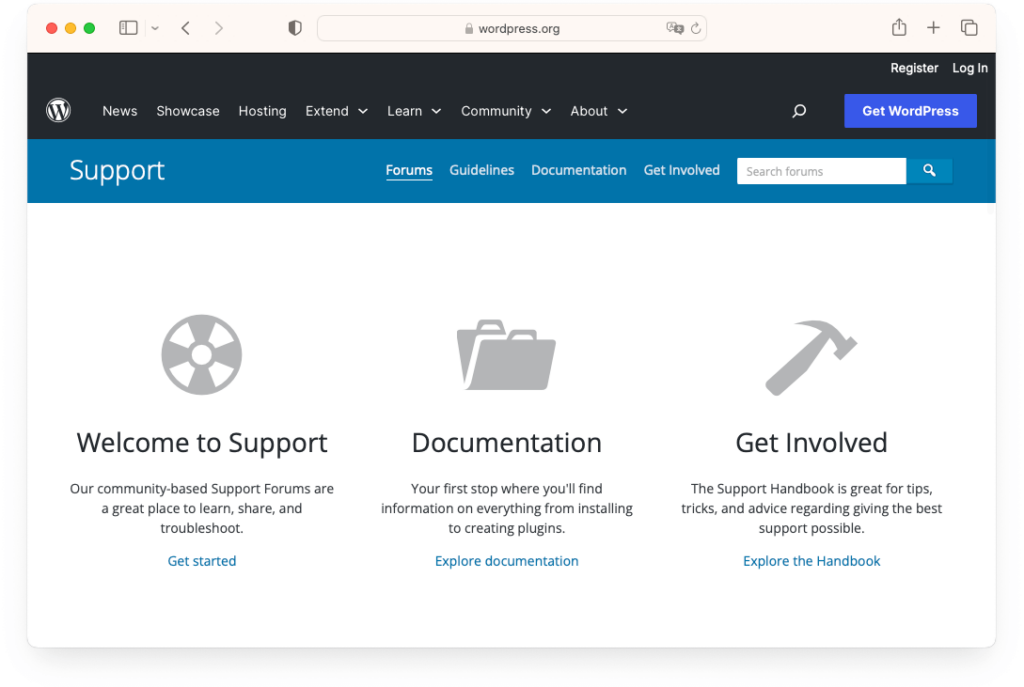
In addition to the forums, there are countless blogs, tutorials, YouTube channels, and online courses dedicated to WordPress. Whether you prefer reading step-by-step guides or watching video tutorials, there’s no shortage of resources to help you learn and troubleshoot. This wealth of information can be a huge asset, but it also means you might need to do a bit more digging to find the answers you’re looking for compared to the more streamlined support Wix offers.
For those who prefer professional support, many third-party companies and freelancers offer WordPress support services. These services can range from general maintenance and updates to custom development and troubleshooting. This can be particularly useful for business owners who want peace of mind knowing their site is in expert hands.
Ultimately, WordPress support is more decentralized and community-driven, which provides a lot of flexibility but may require more effort to find the help you need. The upside is that you’re joining a massive global community with a wealth of knowledge at its disposal.
Bottom Line
When deciding between Wix and WordPress, it’s essential to consider not just your immediate needs, but also the long-term potential of your website. Both platforms have their strengths, but they cater to different types of users and goals.
Wix offers a quick, user-friendly solution for those who want to get online fast with minimal effort. Its drag-and-drop interface and all-in-one approach make it a great option for beginners or small-scale projects. However, if you’re serious about growing your online presence, you may eventually find the limitations of Wix’s closed ecosystem to be restrictive.
On the other hand, WordPress stands out as the platform of choice for those who value flexibility, customization, and scalability. With WordPress, you’re not just building a website—you’re creating a digital foundation that can grow and evolve with your brand. The open-source nature of WordPress allows for endless possibilities, from fully customized designs to advanced functionality powered by plugins.
At WPZOOM, we’re passionate about helping you unlock the full potential of WordPress. Our premium themes and plugins are designed to give you the tools you need to create a professional, unique, and high-performing website that stands out in today’s competitive landscape. Whether you’re building a blog, an online store, or a portfolio, WordPress—paired with the right themes and plugins—offers the power and flexibility to make your vision a reality.
While Wix might get you started, WordPress is the platform that will carry your website forward, supporting your growth with its vast ecosystem and unparalleled customization options. If you’re looking to build a site that can scale with your ambitions, WordPress is the clear choice.

